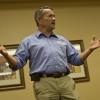Cagle Seeks Middle Ground on 'Religious Liberty' Bill

As governor, Lt. Gov. Casey Cagle would sign a “religious liberty” bill—but not one that allows for discrimination, he told the UGA College Republicans on Wednesday.
The religious liberty issue is one that’s vexed Cagle for years. He supported the legislation in 2016, then reversed course earlier this year before once again backing a limited version.
Gov. Nathan Deal bowed to business interests who’d threatened to boycott Georgia when he vetoed the bill last year, angering Christian conservatives and pleasing LGBT Georgians and their allies who believed the bill would have let Christian-run businesses discriminate.
Companies “don't want to see a state that is discriminating in any way," Cagle said when asked about the religious liberty debate.
Cagle and other Republican gubernatorial candidates signed a pledge in August promising they would enact a religious liberty measure if elected.
"If elected governor, I promised to sign a mirror image of the federal [Religious Freedom Restoration Act]," he said. That 1993 law prohibits the federal government from unduly burdening freedom of religion. It was mainly intended to protect Native Americans’ sacred land and ceremonies involving illegal drugs, but also played into the recent Supreme Court decision allowing Hobby Lobby to stop covering employees’ birth control.
"Am I hiding that I am a strong advocate for religious liberty? No," Cagle said, acknowledging his personal faith. "But I will tell you, I am not for discrimination. We should be known as a state that is inclusive for all.”
Cagle, who’s served as lieutenant governor since 2006, focused mainly on pursuing economic growth.
"This is a new type of economy," he said. "I want to be a governor who understands where the economy is going."
Cagle touted the state's movie industry and called Georgia the “No. 1 state for business." He promised to create 500,000 jobs in four years and enacting a $100 million tax cut in his first 100 days.
Cagle was also excited about the possibility of internet retail giant Amazon building its second headquarters in Georgia. But to get it, "we've got to have a workforce that is second-to-none," he said.
Cagle got deep in the technicalities when discussing his plans to help rural hospitals become financially stable and expand broadband internet to rural parts of the state.
"You have to understand not only the plan, but how to implement it," Cagle said, praising the quick rebuilding of the collapsed I-85 bridge last spring. "If you can really get down to it strategically, you can literally build a bridge in 45 days."
Speaking to college students, Cagle also championed alternative education, such as career academies, to lower high-school dropout rates and prepare students for college or the workforce and answered questions regarding the HOPE Scholarship and college affordability.
"There have to be more choices," Cagle said in regards to the cost of higher education, circling back to the College and Career Academy concept.
Taking questions from the audience, Cagle also discussed his views on President Trump's potentially ending the Deferred Action for Childhood Arrivals program.
"I'm not for illegal immigration. We have to always be a society that stands for law and order," he said in regards to DACA. "That being said, when a child is brought here when they were young, it's not their fault."
Cagle said Republicans and Democrats need to come together to find a solution, and hopes Washington would provide a fix to the issue.
"I don't think it should be amnesty," he said. "But it's bad to paint with a broad brush that everyone is bad for our society."
On medical cannabis, Cagle is hesitant to move forward much more.
"We have allowed the use of medical cannabis and expanded the list of diseases that qualify. The scientific evidence isn't there yet, but the testimonies are good," he said. "In terms of cultivation [in Georgia], I am very, very reluctant to go down that road."
Cagle cited the opioid crisis, and worried that unregulated cultivation could lead to further issues. "I am not convinced at this point that cultivation is the answer," he said.












comments